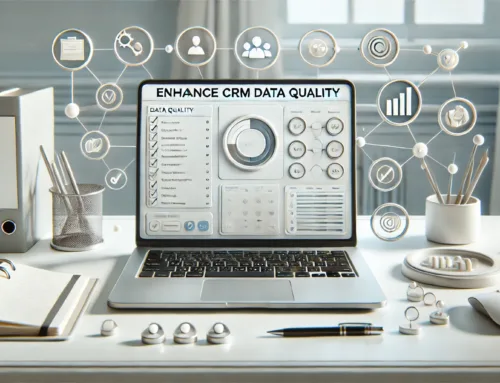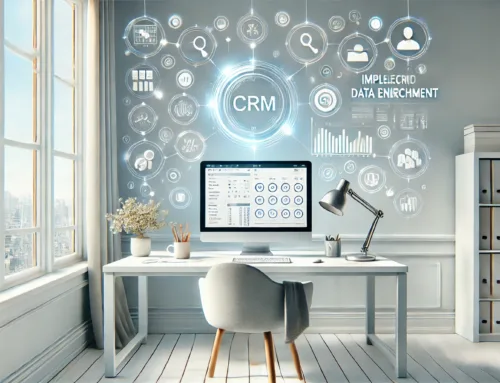To ensure the security of your CRM data in enrichment process, you must prioritize compliance with data privacy regulations and utilize a secure data enrichment tool with robust encryption capabilities and secure data transmission. But, what additional steps can you take to enhance the protection of your CRM data and prevent unauthorized access or breaches?
Understand Data Privacy Regulations
When enriching CRM data, it is crucial to first understand data privacy regulations to ensure compliance and protect sensitive information. Compliance training plays a vital role in educating employees on the legal requirements surrounding data privacy. By familiarizing yourself with privacy policies, you can ensure that data enrichment processes align with the necessary regulations.
Compliance training equips staff with the knowledge needed to handle customer data securely and responsibly. Understanding the intricacies of privacy policies helps in identifying what data can be enriched and how it should be handled to maintain compliance. It also aids in recognizing potential risks associated with data enrichment activities.
Choose a Secure Data Enrichment Tool
Understanding data privacy regulations is foundational to ensuring compliance in the data enrichment process. When choosing a secure data enrichment tool, prioritize features that enhance data protection and streamline compliance management. Look for tools that offer robust encryption capabilities to safeguard sensitive information throughout the enrichment process. Additionally, ensure that the tool complies with relevant data privacy laws such as GDPR or CCPA to mitigate regulatory risks.
A secure data enrichment tool should provide options for secure data transmission and storage, enabling you to maintain the confidentiality and integrity of CRM data. Consider platforms that offer audit trails and access controls to monitor and manage data access effectively. Implementing a tool with built-in compliance management features can simplify regulatory adherence and reduce the likelihood of data breaches or non-compliance penalties. By selecting a data enrichment tool with strong data protection measures and compliance management capabilities, you can enhance the security of your CRM data and build trust with your customers.
Implement Data Encryption
To enhance the security of your CRM data, implementing data encryption is crucial. Data protection is a top priority in safeguarding sensitive information from unauthorized access or breaches. Encryption methods play a fundamental role in ensuring that your CRM data remains secure both at rest and in transit.
When considering data protection through encryption, it is essential to choose robust encryption algorithms that meet industry standards. Implementing strong encryption keys adds an extra layer of security to your CRM data, making it significantly more challenging for malicious actors to decipher the information.
Utilizing encryption methods such as Advanced Encryption Standard (AES) or RSA can help fortify your CRM data against potential security threats. AES, in particular, is widely regarded for its reliability and effectiveness in securing data. By incorporating encryption techniques into your CRM data protection strategy, you can significantly reduce the risk of unauthorized access and data breaches.
Update Security Protocols Regularly
To maintain the integrity of your CRM data security, regularly updating your security protocols is key. Conducting regular audits of your security measures helps identify vulnerabilities that could be exploited by cyber threats. By staying proactive and implementing security patches promptly, you can ensure that your CRM data remains protected from potential breaches.
Regular audits serve as a crucial tool in assessing the effectiveness of your existing security protocols. These audits enable you to identify any weaknesses or gaps in your system that could compromise the confidentiality and integrity of your CRM data. By conducting these assessments on a consistent basis, you can stay ahead of potential security risks and address any issues before they escalate.
In addition to audits, applying security patches in a timely manner is essential for keeping your CRM system secure. Security patches are released by software vendors to fix known vulnerabilities and strengthen your system against potential attacks. By regularly updating your security protocols with the latest patches, you can enhance the overall security posture of your CRM data environment.
Train Staff on Data Security
Implementing a comprehensive staff training program on data security is vital for safeguarding your CRM system against potential threats. Employee awareness and security training are crucial components of this program. By educating your staff on best practices for handling sensitive data, you can reduce the risk of security breaches and unauthorized access.
Training sessions should cover topics such as recognizing phishing attempts, creating strong passwords, and understanding the importance of data encryption. It is essential to emphasize the role each employee plays in maintaining the security of the CRM system. Regularly updating staff on the latest security threats and protocols will help keep them informed and vigilant.
Interactive training modules, workshops, and simulations can help reinforce key concepts and ensure that employees retain the information. Encouraging a culture of cybersecurity awareness within your organization will create a proactive defense against potential data breaches. By investing in your staff’s security training, you are investing in the overall protection of your CRM data.
Monitor Data Access and Usage
As you focus on ensuring the security of your CRM data, another key aspect to consider is monitoring data access and usage. Implementing robust access controls is essential in safeguarding sensitive information. By setting up permissions, you can restrict data access to only authorized personnel, reducing the risk of unauthorized breaches. Regularly review and update these access controls to align with your organization’s changing needs and personnel roles.
Furthermore, tracking the usage of CRM data is crucial for detecting any abnormal or suspicious activities. Usage tracking allows you to monitor who is accessing the data, what actions they are performing, and when these actions occur. By analyzing these usage logs, you can identify potential security threats and take proactive measures to mitigate risks.
To enhance data security, consider implementing real-time monitoring tools that can send alerts for any unusual data access patterns. By staying vigilant and proactive in monitoring data access and usage, you can better protect your CRM data from potential security breaches.
Frequently Asked Questions
How Can I Ensure Data Accuracy After Enrichment?
To ensure data accuracy post-enrichment, utilize data validation for monitoring. Implement quality assurance practices with verification checks. Continuously monitor the enriched data for discrepancies. Regularly validate and verify the accuracy of the data to maintain quality.
What Measures Protect Against Insider Threats in CRM Data?
To safeguard against insider threats in CRM data, implement strict user access controls and robust monitoring systems. Control who can view or modify data, and monitor activities to detect any unauthorized or suspicious behavior promptly.
Is Data Anonymization Necessary for Data Enrichment Processes?
In data enrichment processes, data anonymization is crucial for data privacy and compliance regulations. By anonymizing data, you mitigate risks associated with personal information exposure. Ensure all data is anonymized properly to uphold security standards.
How Do I Handle Data Breaches in CRM Systems Effectively?
When facing data breaches in CRM systems, prioritize incident response. Implement robust encryption protocols to protect sensitive information. Remember, “An ounce of prevention is worth a pound of cure.” Stay vigilant and proactive in safeguarding your data.
What Are the Best Practices for Securely Storing Enriched Data?
To securely store enriched data, implement robust data encryption protocols to safeguard information. Utilize stringent access control measures to restrict unauthorized entry. By combining encryption and access control, you can fortify your data storage against potential security threats effectively.



